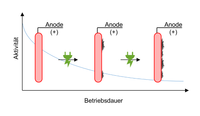ELFION Electrode fouling and corrosion - understanding and solutions for prevention |
During electrosynthesis, organic deposits often occur on the electrodes during operation. This phenomenon is also known as fouling. Persistent fouling causes an electrode to lose a lot of its activity and the desired processes run less selectively, more slowly or even no longer at all, which is why electrodes have to be cleaned or treated regularly.
The formation and nature of fouling is to be investigated in the ELFION project. Methods that allow both chemical and morphological analysis of the deposits will be used or, if necessary, developed. In addition to understanding the fouling processes, the aim of the project is to develop derivations and tests of measures to prevent fouling.
The electrolysis itself must not be influenced by the selected measure, or only to a small extent. The synthesis of aromatic acetals on graphite electrodes serves as a model reaction for investigations. The findings are to be transferred to other industrially relevant electroconversions and electrode materials in order to slow down/avoid electrode fouling and thus achieve the operation of electrolyses with high productivity and long-term stability.
Coordinators:
Siegfried R. Waldvogel (MPI CEC) siegfried.waldvogel@cec.mpg.de
Carsten Streb (JGU)
Thorsten Hoffmann (JGU)
Nicola Aust (BASF) nicola.aust@basf.com
.jpg/picture-200?_=18defa8d620)
